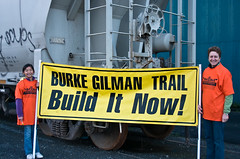
Many Ballard groups gathered on Tuesday, 27 October 2009, to demonstrate and rally for the completion of the "Missing Link" of the Burke-Gilman Trail. (Flickr photo by by Holy Outlaw)
Imagine your dream bike, whatever it might be: the perfect type, the perfect fit, the perfect shape, the best components—and the perfect color. It’s sunny, 80 degrees, no wind and you’re about to ride it for the first time. You roll it out and are just about to hop on and you notice, just in time, one critical thing: no seat post and no saddle. All the bike shops in the city are closed, your friends are all out riding, your other saddle went missing and you’re out of luck.
To me and many, the Burke-Gilman trail is our region’s crown jewel of trails. It supports tremendous numbers and diversity of use and is a backbone of our nonmotorized infrastructure. But while most of it is in beautiful shape, there’s that one critical missing part: the Missing Link. Try to ride your bike through here and it’s often painful.
Fortunately, each day we are closer to finding that saddle and seat post.
Score one for the home team when, once again, a Hearing Examiner (think of her like a judge) ruled in our favor—namely that there will be no “probable significant adverse environmental impacts” from the construction of that tiny but essential trail section. Among other things, four main points stand out about the City’s second environmental review which was under appeal:
- Construction of the Shilshole section won’t cause traffic impacts or hazards like overall average peak hour delays at driveways due to proposed sight distance, width or design.
- Construction of the trail won’t cause significant parking loss.
- Construction of the trail is compatible with existing or zoned land use.
- Construction of a 2-way multi-use trail won’t be inherently unsafe.
I like all of them, but I really like #4. And here’s why. A professionally designed trail segment will result in a safer route for all users, so we’ll stop seeing the crashes at the tracks each week, the close-calls with cars doing U-turns in the unmarked space adjacent to the parking spaces and other dicey encounters. You’d even be able to bike with your kids out to Golden Gardens without fearing for your—or their—safety.
And the Burke-Gilman will be complete.
But even as we keep jumping these costly hurdles that are thrown up in the way of this vision, we’ve still got a few more.
The recent hearing examiner decision doesn’t preclude another appeal by the Ballard Business Appellants. Another appeal would throw the decision back to King County Superior Court Judge Rodgers in another 5 or 6 months. The Appellants have until July 22 to file, and I bet they will. Judge Rogers’ decision could then be appealed to the court of appeals or the state supreme court—so we might not be done quite yet. All the while, and for the past 10 years, the City has been “eager to begin construction on a fully funded and fully designed ‘missing link’ segment,” according to SDOT.
On another front, there’s been talk of striking a deal. According to this piece, “they are working on a “cycle track” solution for the Burke Gilman Trail – one that will take bicyclists through the business district and not affect the maritime industry.”
I’ve seen this solution. It may well find momentum in the coming years as a way to continue Ballard’s rise as a vibrant, prosperous and active urban center. We’re listening and we’re interested. But it’s not the Burke Gilman Trail—it will serve a different purpose; it’s unfunded (unlike the Missing Link) and it lacks any professional engineering design. Consequently, it will take years to complete—and we don’t have years before the next person falls on the tracks or is seriously injured because the present design of Shilshole simply doesn’t work for all road users. To me, it reads as no cash and a need for far more time—a bad combination.
To close, a few words about the maritime industry in Ballard. I grew up in Maine and understand that the maritime industry is at once fragile and robust, strong and struggling, dependent and autonomous. Cascade and our community support not just our local maritime identity, but the family-wage jobs and families that depend on them.
It’s just that we don’t believe in the false dichotomy between safety for all and economic vitality. We want both.
Literally last week, I came across two women with rental bikes and an extended Seattle Bicycle Map—likely with no knowledge of the history of our maritime industry and the length of this particular trail battle—standing at the very edge of the Missing Link next to the Fred Meyer parking lot. They asked me how to get to the locks and to Golden Gardens. And they asked if they had to bike on to a road with cars to get there. I told them, “Yes, you do. For now. But soon you’ll be able to ride there on the trail.”
Yes, perhaps soon. I should have added that there’s a bike shop on the other side that sells the nicest saddles and a heck of a seat post.
Share this post